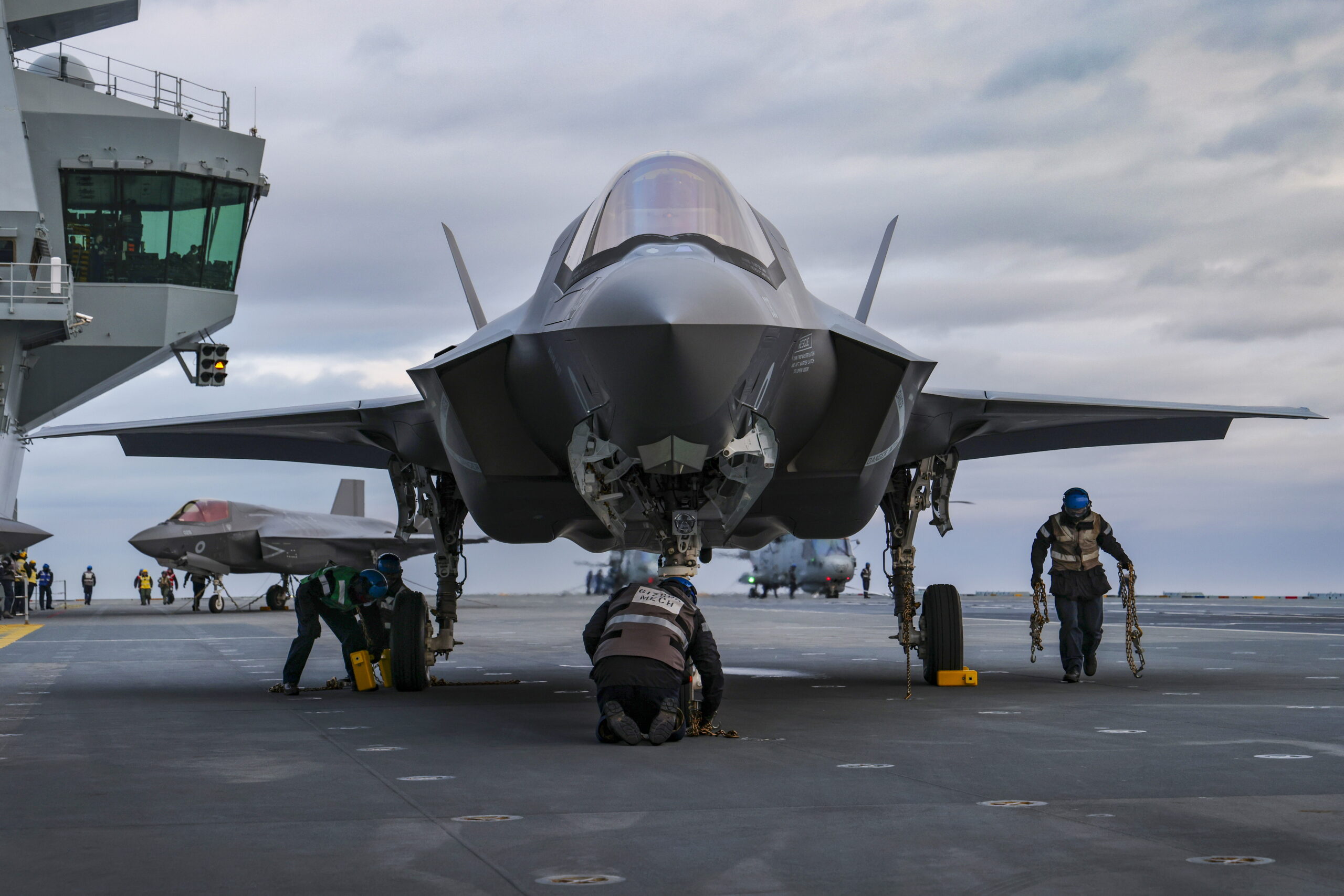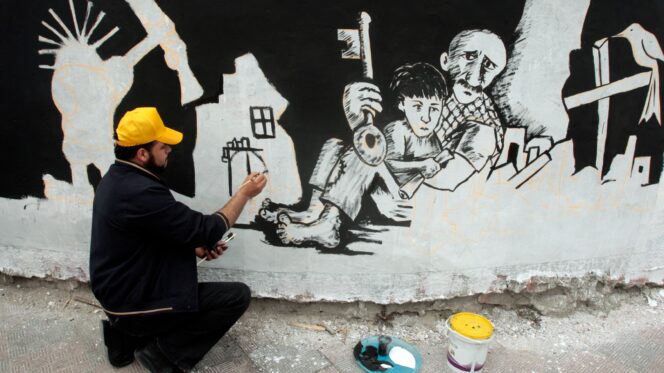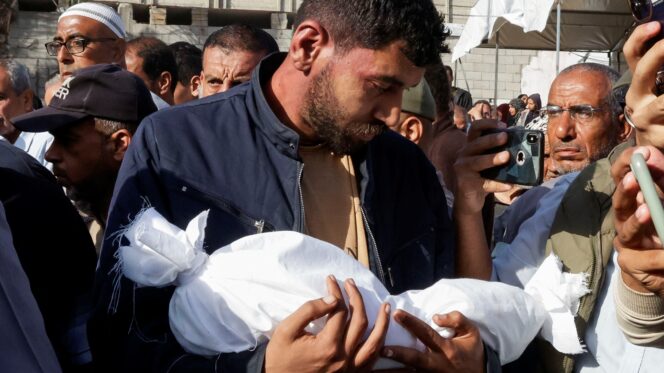The UK Decides Whether Israel Is Committing War Crimes By… Asking Israel

Paywalls? Never. We think quality reporting should be free for everyone – and our supporters make that possible. Chip in today and help build people-powered media that everyone can access.
What’s happening in Gaza has been referred to as “the most documented genocide in history”. Amnesty International has called it a “live-streamed genocide”.
But amid the overwhelming evidence, the UK government’s assessments of whether or not Israel is perpetrating war crimes are based on asking Israel for information. If Israel doesn’t give the information, the UK simply gives up and does not make an assessment.
Lawyers contesting the government’s ongoing sales of weapons to Israel call this approach “engineered wilful ignorance”.
The UK made just one single finding of a potential human rights violation in its assessment of hundreds of airstrikes and shootings in the months leading up to September 2024, when it banned some arms sales to Israel, while maintaining an exemption which allowed the UK to continue sending parts for the F35 fighter jet to Israel indirectly.
Last week, the High Court heard evidence from Palestinian rights group Al-Haq, supported by human rights groups including Amnesty, Human Rights Watch, Oxfam and the Global Legal Action Network (Glan). They are contesting the UK’s continued supply of parts of the F35 fighter jet which has been used to bomb Gaza. The court’s ruling will be delivered in due course.
Lawyers for Al-Haq and Glan had originally intended to argue that the UK government’s assessments of whether Israel has acted within international humanitarian law are flawed. But the court refused these grounds, ruling them “irrelevant” to the specific legal arguments around the F35 exemption.
Despite this, government lawyers spent a significant amount of the court’s time discussing how rigorous their assessments were. “We’d say that that’s quite an underhand move to have done that,” Jennine Walker from Bindmans solicitors, acting for Al-Haq, told Novara Media.
“It would certainly be quite outrageous if [the court] placed weight on the government’s flawed methodology that was no longer part of this legal challenge.”
While Walker and her colleagues were denied the chance to critique the government’s assessments in court, she told Novara Media the assessments are seriously flawed.
“They’ve looked at 413 incidents of concern up to September [2024]. That’s out of tens of thousands of air strikes that are all concerning, and they’ve reached a conclusion that one of them is a possible violation of international humanitarian law.
“So they’ve looked at an incredibly limited number of incidents, and they’ve only made that kind of finding – a possible violation – where they’ve been given information by Israel. So if Israel hasn’t provided information, which it hasn’t for the majority of incidents, they’ve said, ‘We can’t reach any sort of assessment on this’.”
The government’s assessments also look at individual incidents rather than broad patterns, said Walker. They will assess one air strike, “without looking at the whole pattern of destruction of the whole health system or schools, so that’s a major flaw,” she said.
“They’ve placed far too much weight on assurances from Israel, but without looking at statements made by army officials whistleblowers, without looking at Israel’s past conduct in other conflicts and serial breaches of international humanitarian law years before now.
“We call it kind of engineered wilful ignorance. So they’re just saying we don’t have enough information, but then they’re depriving themselves of that information. What information they do have, they are not weighing it and assessing it properly.”
The one possible breach of international humanitarian law that the government did find concerned an Israeli air strike on the charity World Central Kitchen, in which seven aid workers were killed.
“That’s one in which foreign people, including British people, died,” said Walker. “It’s very telling that that is the only strike out of tens of thousands in which they’ve found possible [violations]” was an incident in which “foreign people were killed and Israel was forced to provide some information and in relation to that.”
“We’re saying this is systematic denial of the importance of Palestinian lives.”
Last week, Hamish Falconer, Labour’s Middle East minister, told the House of Commons: “We continue to conduct assessments across a full range of responsibilities under international law. It is simply not true to suggest that we are avoiding making any internal assessment in order to justify policy. We continue to assess these things carefully. We do it on a rolling basis, regularly.”
The government argues that it is necessary to continue supplying F35 parts to the global pool in order to maintain the UK’s place in the F35 programme. Defence secretary John Healey has argued that disrupting the F35 programme would have a “profound impact on international peace and security”. The government has submitted evidence saying that it “would undermine US confidence in the UK and Nato at a critical juncture in our collective history and set back relations”.
Yasmine Ahmed, UK director of Human Rights Watch, has argued: “This is dangerous in any context, but with Donald Trump at the helm in the White House, it borders on the grotesquely absurd.” The Trump White House has blown up the established world order and said the US will no longer be the guarantor of European security.
In March, the Israeli Air Force (IAF) boasted that it had become the first air force to activate so-called “beast mode” on its F35 fighters which have been used in bombing raids which have killed civilians in Gaza. This involves attaching heavier payloads to the wings, increasing the “lethal capabilities” of the aircraft. This compromises on stealth but that’s not a problem for the IAF, as Gaza has no air defences. (By contrast, the Houthis nearly shot down an F35 over Yemen in May, causing panic.)
Walker argues that “it should be possible to continue supplying the global pool, but to say we don’t want the parts that we make to end up in [Israeli] fighter jets or maintaining Israel’s fleet”.
This week, the UK, France and Canada released a joint statement condemning the expansion of Israel’s military operations in Gaza and demanding that humanitarian aid be allowed into Gaza.
For Walker, this raises further questions. “We’ve seen their assessment of risk of genocide from July last year. Have they made a new one? What are their assessments now?” she asked.
“Can it be backed up by action, this statement? Are they working with allied countries to prevent F35 parts being supplied to Israel? If not, it’s just empty words.”
Simon Childs is a commissioning editor and reporter for Novara Media.


